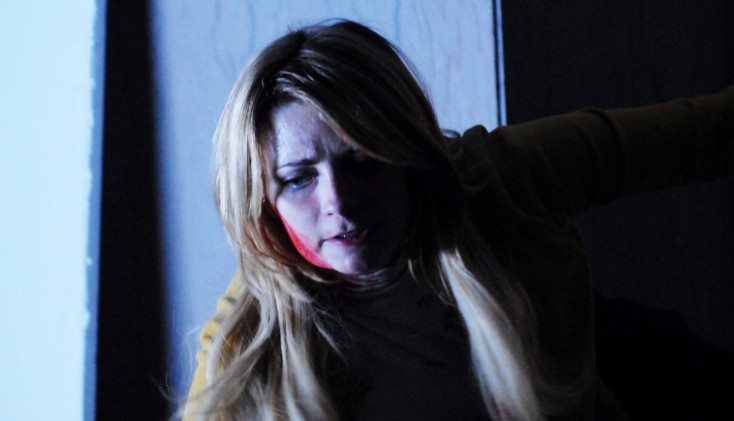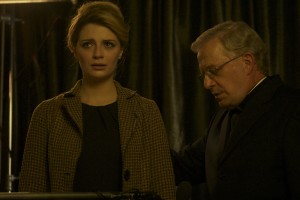By ANGELA DAWSON
Front Row Features
HOLLYWOOD—Mischa Barton first garnered international fame as the little girl hiding under Haley Joel Osment’s bed in M. Night Shyamalan’s supernatural drama “The Sixth Sense,” and she has enjoyed a steady career in show business ever since.
The 27-year-old London native currently stars in the low-budget horror movie “A Resurrection,” in which she plays a high school guidance counselor assigned to deal with a student, who obviously is disturbed over his older brother’s recent death. The boy insists that his sibling was murdered by a gang of kids, but his account, and some strange goings on at the school, don’t quite add up. Delving deeper into the incident, she discovers there is a supernatural element involved, which could lead to more bloodshed unless she can get to the bottom of it first.
Barton spoke by phone about her newest project, in which she also serves as an associate producer, working with her lovable late co-star Michael Clarke Duncan, in what turned out to be his final film role and what’s ahead.
Q: Are you drawn to the horror genre?
Barton: Not really. This one was the reason that I watched horror movies to begin with. The first film I was in that would be called a scary movie was “The Sixth Sense,” and then it was on to other types of films, except for maybe (2009’s suspense horror) “Homecoming.” This is for me, the first one that prompted me to watch the classics. It got me watching “Rosemary’s Baby” and “The Amityville Horror,” the ‘70s one. I like those a lot. It’s what influenced me to want to do a piece like this.
Q: You’re an associate producer on this. What did that responsibility entail for you?
Barton: It was very much like a family project. It was like everybody wanted to be really involved. (Co-stars) Michael Clarke Duncan and Devon Sawa got on board and we found J. Michael (Trautmann). I think he’s fantastic and awesome. It was about finding the right creepy boy. He was the right boy with the right look to play this character that will keep you guessing. It was a couple of years ago that we shot this so I’m happy that it’s coming out now. We shot it in 20 days. It wasn’t a huge budget. I think that’s probably better, especially in this genre. A lot of people spend a lot of money on CGI, and making things scary and it doesn’t always work. For this one, it was a straightforward script about a disturbed boy, and I think it turned out quite well considering (the budget) we had to work with.
Q: It’s definitely more suspense than effects-driven.
Barton: Yeah. That’s why people like it, not because it’s some big budget thing. It was a labor of love and we got it done quickly and it’s nice to see it cut together and kind of looking good and people enjoying it at all, really. It’s nice when these things get released.
Q: It’s kind of a throwback to the horror movies of the ‘80s, isn’t it?
Barton: It’s nice that it’s low budget more than anything. If you took the same idea and made a huge fuss over it, and spent millions of dollars, it wouldn’t get much better. It’s nice that it’s at the level it’s at. True horror and genre people will like it. It’s not pretentious in any way.
Q: And there’s no exploitation of the women.
Barton: I’m the only girl in it. Well, there are some (girls) in the school but there’s no peripheral girl characters or anything.
Q: This film has an extra poignancy because it was Michael Clarke Duncan’s last film. What was it like working with him?
Barton: I just remember his sweetness and kindness. He was a lovely man. Every time he came on set, he would make people laugh and he liked it to be a real jovial atmosphere on set. That’s just the person he was. He just wanted to make people laugh and he was silly and the scene where I throw the pen at him and stuff, we just would joke around. There’s nothing bad you can say about him. He was just the nicest guy.
Q: I’m sure you were sad when he passed away last September.
Barton: I was. He was just the nicest guy. It’s tragic. I felt he had so much (more) to play. He was a great actor and solid and made everyone around him feel comfortable. That, in itself, is a great thing—when you’re able to put other actors at ease.
Q: Why did you shoot this movie in Pittsburgh?
Barton: I’m not sure. That’s actually the second film I’ve done there. It’s probably because it’s gritty, anywhere America. It’s not specific to one place. It didn’t have to be there. It’s nice that it’s an East Coast town. It’s in the snow. It adds something to the film.
Q: You did some stage work last year, “Steel Magnolias” in Ireland.
Barton: I did, in Dublin at the Gaiety Theatre.
Q: You started out doing theater. What was it like getting back on the stage?
Barton: I love the stage. It is where I started and I was lucky enough to work with some of the best people (including Richard Attenborough) in New York back in the day. There’s a chance I might go do an off-Broadway piece this summer. I may not be able to stay for the full run, but at least I would open the role. I like the theater a lot. For an actor, that’s where the crux of it all is. That’s where you get down to the nitty gritty. It’s nice to have that proper rehearsal time. You feel so alive. It’s so rewarding. You feel really on point. You feel sharp when you’re done, which is nice.
Q: There are always the happy accidents when you’re doing live performance.
Barton: It keeps you guessing. It’s quite a thrill when you’ve got that audience really enjoying it. It’s a great feeling.
Q: You’re working on a British TV drama called “Tomorrow?”
Barton: I don’t know. There are so many wrong rumors out there. I don’t know where they get them from. I don’t think “Tomorrow” is a real thing that is going on at the moment.
Q: What are your plans?
Barton: There’s probably that off-Broadway play, if I do get to open that this summer at the Beckett. Then I’m going to do one called “In Love Butterfly.” It’s a working title because they don’t want it to get out there too much. They’re keeping it under wraps. It’s already set up and I’m attached to that. It’s a great, complex role. She’s a character with many layers. She’s fascinating. It should be a gritty part. She’s an alcoholic and, at the same time, a beautiful, fun, sexy girl who tends to hide (her alcoholism) until she doesn’t. Then, it starts to fall apart on her again. She’s one of those people who puts up a good front, a good façade for a while, until she is overwhelmed by her own disease. It’s a great role for a woman and it’s the only real female role in it. Then, there are the men in her life. It’s one of the best roles I’ve been offered. So I’m concentrating on that more than anything, because I can really see that role as being as good as some of the films I was lucky enough to do in the past. It’s an independent film.
Q: Do you prefer doing independent film to studio films?
Barton: It’s all about the people who bring it to you and if they are the right people. I enjoy a more classic style of filmmaking. I like the old way of doing it—not fast, but proper filmmaking. I’m also probably doing a role in (action drama) “For Hire,” if we get that going at Universal. That’s to play the wife, so it’s all dependent on the male lead.
Q: Do you make your home in the United States or the UK?
Barton: I split my time between London and L.A., and New York, obviously, because it’s where I grew up. I’m in London a lot these days. I have a place there and a place (in L.A.), which I find is a nice balance between the two, with the culture, the weather, the seasons, the people and all that. (In L.A.), we have the great weather and this is where the business is. I’ve lived her for about eight years on and off. I came out here first when I was a teenager. I’ve been going back and forth to New York, and I even lived in Paris along the way. I’ve kept the house here so it’s nice to have that option.




